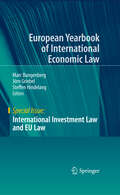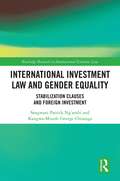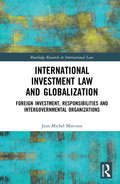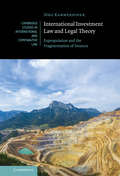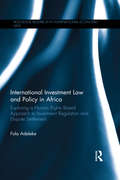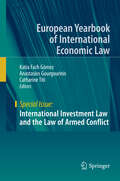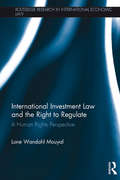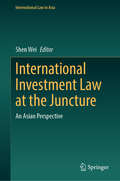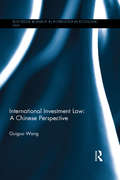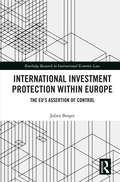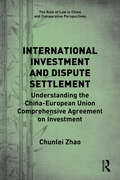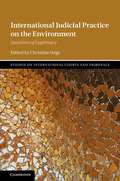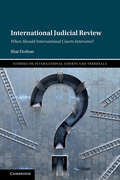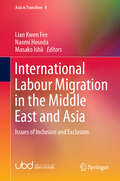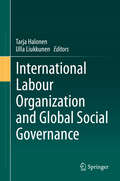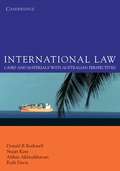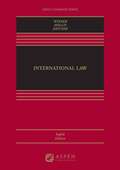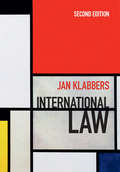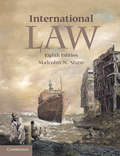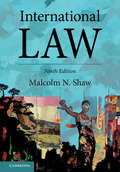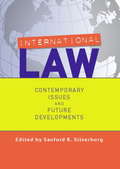- Table View
- List View
International Investment Law and EU Law
by Marc Bungenberg Joern Griebel Steffen HindelangThe entry into force of the Lisbon Treaty entails sweeping changes with respect to foreign investment regulation. Most prominently, the Treaty on the Functioning of the European Union (TFEU) now contains in its Article 207 an explicit competence for the regulation of foreign direct investment as part of the Common Commercial Policy (CCP) chapter. With this new competence, the EU will become an important actor in the field of international investment politics and law. The new empowerment in the field of international investment law prompts a multitude of questions. This volume analyzes in depth the new "post-Lisbon situation" in the area of investment policy, provokes further discussion and offers new approaches.
International Investment Law and Gender Equality: Stabilization Clauses and Foreign Investment (Routledge Research in International Economic Law)
by Sangwani Patrick Ng’ambi Kangwa-Musole George ChisangaThis book analyses the impact that stabilization clauses have on the development of human rights and gender laws in resource rich nations.Given the fact that stabilization clauses freeze the law for as long as the contract subsists there has been debate on the negative impact stabilization clauses have on the progressive development of human rights in the host State. Firstly, the book examines the mechanisms investors utilise in protecting themselves from host State prerogatives. It then explores the theoretical basis on which stabilization clauses are applied and upheld by arbitral tribunals, and assesses how they can be drafted in a way that protects human rights, particularly in relation to gender discrimination, without forcing the resource rich nations to lose momentum in attracting foreign direct investment. Using Zambia and the Gender Equity and Equality Act of 2015 as a case study, the book explores the compatibility of the legislation with the stabilization clauses contained in the country’s Development Agreements.The book will be of interest to practitioners, scholars and students of international investment law, human rights law and contract law.
International Investment Law and Globalization: Foreign Investment, Responsibilities and Intergovernmental Organizations (Routledge Research in International Law)
by Jean-Michel MarcouxIn a context of neoliberal globalization, have the processes of elaboration and implementation of foreign investors' responsibilities by intergovernmental organizations reached the realm of legality? Using an analytical framework and a methodology that combines international law with international relations, this book provides a twofold answer to thisquestion. First, it demonstrates that the normative integration of foreign investors' responsibilities in international investment law is fragmented and consistent with the interests of the most powerful actors. Second, while using the interactional theory of international law to assess the normative character of several international instruments elaborated and implemented by intergovernmental organizations, it highlights the sense of obligation that each instrument generates. The analysis demonstrates that such a codification process is marked by relations of power and has resulted in several social norms, with relatively few legal norms.
International Investment Law and Legal Theory: Expropriation and the Fragmentation of Sources (Cambridge Studies in International and Comparative Law)
by Jörg KammerhoferExpropriation is a hotly debated issue in international investment law. This is the first study to provide a detailed analysis of its norm-theoretical dimension, setting out the theoretical foundations underlying its understanding in contemporary legal scholarship and practice. Jörg Kammerhofer combines a doctrinal discussion with a theoretical analysis of the structure of the law in this area, undertaking a novel approach that critically re-evaluates existing case-law and writings. His approach critiques the arguments for a single expropriation norm based on custom, interpretation and arbitral precedents within international investment law, drawing also on generalist international legal thought, to show that both cosmopolitan and sovereigntist arguments are largely political, not legal. This innovative work will help scholars to understand the application of theory to investment law and help specialists in the field to improve their arguments.
International Investment Law and Policy in Africa: Exploring a Human Rights Based Approach to Investment Regulation and Dispute Settlement (Routledge Research in International Economic Law)
by Fola AdelekeThis book studies the international investment law regime in Africa and provides a comprehensive analysis of the current treaty practices in Africa from global, regional and domestic perspectives. It develops a public interest regulation theory to highlight the role of investment regulation in sustainable development and the protection of human rights. In doing so, the book identifies seven factors that should be considered by arbitrators in resolving international investment disputes that affect the public interest. It considers how corporations can be held accountable through investment treaties in the absence of a global treaty on business and human rights while protecting the rights of investors and their investments. Furthermore, the book explores the current objectives and features of investor-state dispute settlement (ISDS) as well as the deficiencies and its intersection with the rule of law. It identifies alternatives for ISDS and the extent to which these alternatives address the objectives of attracting investment, depoliticise investment disputes, promote the rule of law and offer remedies to investors. These solutions are offered in relation to the protection of human rights, the promotion of sustainable development and the right of states to introduce domestic public interest regulation. Finally, the book takes a prospective stance and discusses future trends for dispute settlement and investment rulemaking in Africa.
International Investment Law and the Law of Armed Conflict (European Yearbook of International Economic Law)
by Katia Fach Gómez Anastasios Gourgourinis Catharine TitiAssessing the extent to which armed conflict impacts the obligations that states have towards foreign investors and their investments under international investment treaties requires considering a wide range of issues, many of which are systemic in nature. These include substantive and procedural topics, not only with regard to international investment law, but also concerning the law on the use of force, international humanitarian law and human rights law, the law of treaties, the law of state responsibility and the law of state succession.This volume provides an in-depth assessment of the overlap between international investment law and the law of armed conflict by charting the terrain of the multifaceted and complex relationship between these two fields of public international law, fostering debate and offering novel perspectives on the matter.
International Investment Law and the Right to Regulate: A human rights perspective (Routledge Research in International Economic Law)
by Lone Wandahl MouyalThe book considers the ways in which the international investment law regime intersects with the human rights regime, and the potential for clashes between the two legal orders. Within the human rights regime states may be obligated to regulate, including a duty to adopt regulation aiming at improving social standards and conditions of living for their population. Yet, states are increasingly confronted with the consequences of such regulation in investment disputes, where investors seek to challenge regulatory interferences for example in expropriation claims. Regulatory measures may for instance interfere with the investment by imposing conditions on investors or negatively affecting the value of the investment. As a consequence, investors increasingly seek to challenge regulatory measures in international investment arbitration on the basis of a bilateral investment treaty. This book sets out the nature and the scope of the right to regulate in current international investment law. The book examines bilateral investment treaties and ICSID arbitrations looking at the indicative parameters that are granted weight in practice in expropriation claims delimiting compensable from non-compensable regulation. The book places the potential clash between the right to regulate and international investment law within a theoretical framework which describes the stability-flexibility dilemma currently inherent within international law. Lone Wandahl Mouyal goes on to set out methods which could be employed by both BIT-negotiators and adjudicators of investment disputes, allowing states to exercise their right to regulate while at the same time providing investors with legal certainty. The book serves as a valuable tool, an added perspective, for academics as well as for practitioners dealing with aspects of international investment law.
International Investment Law at the Juncture: An Asian Perspective (International Law in Asia)
by Shen WeiThe book focuses on some of the most pressing issues in international investment law in Asia, such as the role of developing countries, the rebalancing between the investors’ rights protection and the host states’ right to regulate, the ISDS reform, among others. The book investigates these issues by looking into the bilateral investment treaties and investment arbitration cases in the region. The readers will benefit from this book’s rich content and wide coverage. For instance, the readers would learn more about Asian states’ Bilateral Investment Treaty law and practice and their standing on international investment law. The book provides a fresh angle to most readers who may be more exposed to the Western perspective on the topic, providing a more complete picture to add to the readers’ understanding of international investment law and in particular its evolution and future possibilities.
International Investment Law: A Chinese Perspective (Routledge Research in International Economic Law)
by Guiguo WangIncreasing and intensified cross-border economic exchange such as trade and investment is an important feature of globalization. In the past, a distinction could be made between capital importing and exporting countries, or host and home countries for foreign direct investment (FDI). Due to globalization, FDI is presently made by and in both developed and developing countries. Differences in political, economic and legal systems and culture are no longer obstacles for FDI, and to varying degrees the economic development of almost all countries is closely linked with the inflow of FDI. This book conducts critical assessments of aspects of current international law on FDI, focusing on cases decided by the tribunals of the International Centre for Settlement of Investment Disputes (ICSID) and other tribunals as well as decisions of annulment ad hoc committees of the ICSID. In examining such cases, Guiguo Wang takes into account the Chinese culture and China’s practice in the related areas. The book explores topics including: the development and trend of international investment law; unilateral, bilateral and multilateral mechanisms for encouraging and protecting FDIs; determination of qualified investors and investments and consent as conditions for protection; relative and absolute standards of treatment; determination of expropriation in practice; assessment of compensation for expropriation; difficulties in enforcing investment arbitral awards; and alternatives for improving the existing system. The book will be of great use and interest to scholars, practitioners and students of international investment law and international economic law, Asian law, and Chinese studies.
International Investment Protection within Europe: The EU’s Assertion of Control (Routledge Research in International Economic Law)
by Julien BergerThe steadily rising number of investor-State arbitration proceedings within the EU has triggered an extensive backlash and an increased questioning of the international investment law regime by different Member States as well as the EU Commission. This has resulted in the EU’s assertion of control over the intra-EU investment regime by promoting the termination of bilateral intra-EU investment treaties (intra-EU BITs) and by opposing the jurisdiction of arbitral tribunals in intra-EU investor-State arbitration proceedings. Against the backdrop of the landmark Achmea decision of the European Court of Justice, the book offers an in depth analysis of the interplay of international investment law and the law of the European Union with regard to intra-EU investments, i.e. investments undertaken by an investor from one EU Member State within the territory of another EU Member State. It specifically analyses the conflict between the two investment protection regimes applicable within the EU with a particular emphasis on the compatibility of the international legal instruments with the law of the European Union. The book thereby addresses the more general question of the relationship between EU law and international law and offers a conceptual framework of intra-European investment protection based on the analysis of all intra-EU BITs, the Energy Charter Treaty and EU law, as well as the arbitral practice in over 180 intra-EU investor-State arbitration proceedings. Finally, the book develops possible solutions to reconcile the international legal standards of protection with the regionalized transnational law of the European Union.
International Investment and Dispute Settlement: Understanding the China–European Union Comprehensive Agreement on Investment (The Rule of Law in China and Comparative Perspectives)
by Chunlei ZhaoThis book analyzes the dispute settlement mechanisms under the EU-China Comprehensive Agreement on Investment (CAI), including the already established mechanisms for general state-to-state dispute settlement and the Mechanism to Address Differences for investment and sustainable development issues. When China and the EU, two of the biggest players in international investment, announced the completion of the China-European Union CAI negotiations, the dispute settlement system remained incomplete. While they reached an agreement on state-to-state dispute settlement, the controversial investor-state dispute settlement is subject to ongoing negotiations. This book explores the possible procedural design of investor-state dispute settlement mechanisms under the EU-China CAI, including potential proposals, issues, and solutions. In addition, this work analyzes the separation, connection, and combination of state-to-state and investor-state dispute settlement, all with a mind to ensuring the function and operation of diverse mechanisms and establishing a comprehensive system for successful investment dispute settlement. Focusing on the complete dispute settlement system under the EU-China CAI, this book will be a valuable resource for students, academics, and policymakers working in the areas of international dispute resolution, international investment law, international economic law, and comparative law.
International Judicial Practice on the Environment: Questions of Legitimacy (Studies on International Courts and Tribunals)
by Christina VoigtMore and more environmental cases are being heard and decided by international courts and tribunals which lack special environmental competence. This situation raises fundamental questions of legitimacy of the environmental practice of international courts. This book addresses inter alia questions of who has legal standing to bring an environmental claim before an international court, on which legal norms is the case decided and whether judges have the necessary expertise to adjudicate environmental cases of often complex nature. It analyses which challenges international courts face, which possibilities they have and which advances international judicial practice has been able to make in protecting the environment. Through the prism of legitimacy important insights emerge as to whether international courts and tribunals are fit for addressing some of the most pressing global challenges of our time.
International Judicial Review: When Should International Courts Intervene? (Studies on International Courts and Tribunals)
by Shai DothanThis book is motivated by a question: when should international courts intervene in domestic affairs? To answer this question thoroughly, the book is broken down into a series of separate inquiries: when is intervention legitimate? When can international courts identify good legal solutions? When will intervention initiate useful processes? When will it lead to good outcomes? These inquiries are answered based on reviewing judgments of international courts, strategic analysis, and empirical findings. The book outlines under which conditions intervention by international courts is recommended and evaluates the implications that international courts have on society.
International Labour Migration in the Middle East and Asia: Issues of Inclusion and Exclusion (Asia in Transition #8)
by Kwen Fee Lian Naomi Hosoda Masako IshiiThe discourse on migration outcomes in the West has largely been dominated by issues of integration, but it is more relevant to view immigration in non-Western societies in relation to practices of exclusion and inclusion. Exclusion refers to a situation in which individuals and groups are usually denied access to the goods, services, activities and resources associated with citizenship. However, this approach has been criticised in relation to gender issues, which are very relevant to the situation of migrants. The authors in this volume address this criticism. Furthermore, when framed within a North–South discourse, it may be potentially ethnocentric to assume that the experience of exclusion is cross-culturally uniform. Indeed, work on migration issues has invariably been conducted within such a discourse. The contributors go beyond this binary discourse of ‘exclusion versus inclusion’ which has dominated migration research. They examine the situation of migrants in the Middle East and Asia as one that encompasses both exclusion and inclusion, addressing related concepts of empowerment, ethnocracy, the feminisation of migration and gendered geographies of power, liberal constraint and multiculturalism, individual agency, migrant-friendly discourses, spaces of emancipation and spaces of insecurity. The book highlights current research in the Arab Gulf states, and examines multiculturalism in Asia more broadly. It will be of particular interest to students and researchers in international labour migration studies in the Middle East and Asia.
International Labour Organization and Global Social Governance
by Ulla Liukkunen Tarja HalonenThis open access book explores the role of the ILO (International Labour Organization) in building global social governance from multiple and mutually complementary perspectives. It explores the impact of this UN´s oldest agency, founded in 1919, on the transforming world of work in a global setting, providing insights into the unique history and functions of the ILO as an organization and the evolution of workers’ rights through international labour standards stemming from its regulatory mechanism.The book examines the persistent dilemma of balancing the benefits of globalization with the protection of workers. It critically assesses the challenges that emerge when international labour standards are implemented and enforced in highly diverse regulatory frameworks in international, regional, national and local contexts. The book also identifies feasible ways to achieve more inclusive labour protection, putting into perspective the tension between the economic and the social in the ILO’s second century of operation. It includes reflections on the work of the ILO World Commission on the Social Dimension of Globalisation by Tarja Halonen, who as President of Finland co-chaired the Commission with Benjamin William Mkapa, President of Tanzania.Written by distinguished experts and scholars in the fields of international labour law and international law, the book provides an insightful and in-depth analysis of the role of the ILO as an international organization devoted to decent work and social justice. It also sheds light on tripartism and its particular role in the work of the ILO, examining the challenges that a profoundly changing working life presents in terms of labour protection and social justice, and examining the transnational dimension of labour law. Lastly, the book includes a postscript by Nobel economics laureate Professor Joseph E. Stiglitz.
International Law
by Donald R. Rothwell Stuart Kaye Afshin Akhtarkhavari Ruth DavisWith a strong focus on Australian practice and interpretation of international law, this comprehensive cases and materials textbook will provide students with a contemporary understanding of an area of law that has seen major changes in recent years. Written by a team of pre-eminent experts, International Law: Cases and Materials with Australian Perspectives is unique in reflecting the Australian context, perspectives and values on international law. Each chapter covers a substantive area of the law with specialist topics on human rights, law of the sea, and international environmental law. Students will be able to readily identify the key principles, rules and distinctive learning points and will benefit from the clear exposition of state practice in the field, how it has contributed to the development of the law, and how Australian governments have viewed and interpreted international law.
International Law
by Donald R. Rothwell Stuart Kaye Afshin Akhtarkhavari Ruth DavisWhile the size of the world's fishing catch remains at a constant level, current fishing practices are placing increasing pressure on stocks, and in turn threatening the communities which rely on them. This work examines the role of international law in dealing with this crisis in world fisheries, discussing the principles of marine living resource management found in contemporary international law, and analysing the means by which those principles are implemented. The study is focused around the two principal approaches to fisheries management: The first based upon maximising the yield of particular stocks, and reflected in the content of the 1982 United Nations Convention on the Law of the Sea; And The second founded on the precautionary approach And The associated notion of risk assessment, which encourage taking into account the management of the entire ecosystem. The author explores the legal bases of these different approaches and charts their development in international law. The work makes a comparative analysis of the two systems with reference to two international conventions, operating in analogous polar environments: The Bering Sea `Doughnut Hole' Convention, designed to preserve the pollock stock in the central area of the Bering Sea; And The Convention For The Conservation of Antarctic Marine Living Resources (CCAMLR), designed to manage all the elements of the marine ecosystem of the Southern Ocean. The author concludes with a discussion of the difficulties common to both approaches in the area of compliance, and proposes a number of mechanisms by which the management of stocks could be improved.
International Law
by Donald R. Rothwell Stuart Kaye Afshin Akhtarkhavari Ruth Davis Donald R. Rothwell Stuart Kaye Afshin AkhtarkhavariWhile the size of the world's fishing catch remains at a constant level, current fishing practices are placing increasing pressure on stocks, and in turn threatening the communities which rely on them. This work examines the role of international law in dealing with this crisis in world fisheries, discussing the principles of marine living resource management found in contemporary international law, and analysing the means by which those principles are implemented. The study is focused around the two principal approaches to fisheries management: the first based upon maximising the yield of particular stocks, and reflected in the content of the 1982 United Nations Convention on the Law of the Sea; and the second founded on the precautionary approach and the associated notion of risk assessment, which encourage taking into account the management of the entire ecosystem. The author explores the legal bases of these different approaches and charts their development in international law. The work makes a comparative analysis of the two systems with reference to two international conventions, operating in analogous polar environments: the Bering Sea `Doughnut Hole' Convention, designed to preserve the pollock stock in the central area of the Bering Sea; and the Convention for the Conservation of Antarctic Marine Living Resources (CCAMLR), designed to manage all the elements of the marine ecosystem of the Southern Ocean. The author concludes with a discussion of the difficulties common to both approaches in the area of compliance, and proposes a number of mechanisms by which the management of stocks could be improved.
International Law
by Duncan B. Hollis Allen S. Weiner Chimène KeitnerInternational Law, Eighth Edition, by the deeply experienced authorship team of Allen S. Weiner, Duncan B. Hollis, and Chimène I. Keitner, provides students with a foundational understanding of international law for those required to confront legal problems across borders, including treaties, customary international law, jurisdiction, and the UN system. International Law, Eighth Edition, by the deeply experienced authorship team of Allen S. Weiner, Duncan B. Hollis, and Chimène I. Keitner, provides students with a foundational understanding of international law for those required to confront legal problems across borders, including treaties, customary international law, jurisdiction, and the UN system. International Law, Eighth Edition, offers a comprehensive treatment of contemporary international law, including key recent developments in the field, and provides comprehensive coverage of foundational international law questions faced by practitioners, including the nature and sources of international law, the subjects of international law (states and international organizations), and the jurisdictional powers and immunities of states. Authored by international law professors and leading scholars in the field who also have significant practical experience, the book also addresses key doctrinal topics, with reference to important contemporary foreign policy issues, including (i) international human rights, (ii) the law of the sea, (iii) international environmental law, (iv) the use of force and the law of armed conflict, and (v) international criminal law.
International Law
by Jan KlabbersInternational Organizations assembles sixteen important essays addressing various issues relating to the law of international organizations, highlighting theoretical issues and ongoing political debates and emphasizing issues of control. The introductory essay provides an overview of the development of the politico-legal debate and situates the law of international organizations historically and in its contemporary context.
International Law
by Jan KlabbersThe Finnish Yearbook of International Law aspires to honour and strengthen the Finnish tradition in international legal scholarship. Open to contributions from all over the world and from all persuasions, the Finnish Yearbook stands out as a forum for theoretically informed, high-quality publications on all aspects of public international law, including the international relations law of the European Union. The Finnish Yearbook publishes in-depth articles and shorter notes, commentaries on current developments, book reviews and relevant overviews of Finland's state practice. While firmly grounded in traditional legal scholarship, it is open for new approaches to international law and for work of an interdisciplinary nature. The Finnish Yearbook is published for the Ius Gentium Association (the Finnish Society of International Law) by Hart Publishing. Further information may be found at www. fybil. orgINDIVIDUAL CHAPTERSPlease click on the link below to purchase individual chapters from Volume 20 through Ingenta Connect:www. ingentaconnect. comSUBSCRIPTION TO SERIESTo place an annual online subscription or a print standing order through Hart Publishing please click on the link below. Please note that any customers who have a standing order for the printed volumes will now be entitled to free online access. www. hartjournals. co. uk/fyil/subs
International Law
by Shaw Malcolm N.This fifth edition of Malcolm Shaw's bestselling textbook on international law provides a clear, authoritative and comprehensive introduction to the subject. This leading text has been fully revised and updated to Spring 2003 to take account of new developments in the field. Basically preserving the structure which made the previous edition so successful, a new chapter on Inter-state Courts and Tribunals pays special attention to the role of the International Court of Justice and the International Tribunal on the Law of the Sea and there is a new chapter on international humanitarian law. Also examined are arbitration tribunals set up for dispute settlement and the role of international institutions such as the WTO in resolving conflicts. The prosecution of individuals for violations of international law is examined. Additional coverage of events in Kosovo and Iraq analyses the questions of humanitarian intervention and the role of the UN. Written in a clear and accessible style, and setting the subject firmly in the context of world politics and the economic and cultural influences affecting it, this book remains a highly readable and invaluable resource for students and practitioners alike. The scope of the text makes this essential reading for students of international law, international relations and the political sciences. The book is also designed to be of value for professionals and for governmental and international civil servants. Book jacket.
International Law
by Malcolm N. ShawInternational Law is the definitive and authoritative text on the subject. It has long been established as a leading authority in the field, offering an unbeatable combination of clarity of expression and academic rigour, ensuring understanding and analysis in an engaging and authoritative style. Explaining the leading rules, practice and caselaw, this treatise retains and develops the detailed referencing which encourages and assists the reader in further study. This new edition has been fully updated to reflect recent developments. In particular, it has expanded the treatment of space law and of international economic law, and introduced new sections on cyber operations and cyber warfare, as well as reflecting the Covid-19 crisis. Both clarifying fundamental principles and facilitating additional research, International Law is invaluable for students and for those occupied in private practice, governmental service and international organisations.
International Law
by Malcolm N. Shaw QCWhat is the relationship between a State and its territory? How has the process of acquiring territory evolved? What happens in cases where an occupying force is involved? What about cases where a territory is being administered by an international body? This book examines the international legal principles relating to territory, and surveys the role of territory within the international political system. Shaw examines the long historical evolution of the international law of territory- from the concepts of discovery, control, conquest and succession, to colonial protectorates and the more modern processes of decolonization and the principle of self-determination. Once independent, the state is protected by the international legal principle of territorial integrity. The nature of this principle and the legal challenges to it are examined. This book also explores the legal principles in play in boundary disputes and the nature and role of boundary treaties. Finally, Shaw examines situations where a non-sovereign power exercises control over a territory, including cases of belligerent occupation and aspects of international territorial administration.
International Law
by Sanford R. SilverburgThis reader in international law was put together by editor Silverburg (political science, Catawba College) primarily to serve two purposes: to provide instructors with a single repository of writings from which they can draw both information and perspective on traditional elements of the field as well as more nuanced facets and to provide students with access to the perspectives of non-Western analysts and specialists. He has collected 29 readings and presents them in sections dealing with international law foundations, non-territorialism, economic instruments, courts, international humanitarian law, the environment and air space and maritime regimes, the use of force and terrorism, postcolonialism, and international political interaction. Annotation ©2011 Book News, Inc. , Portland, OR (booknews. com)
